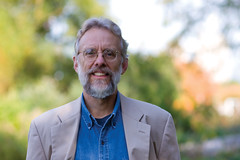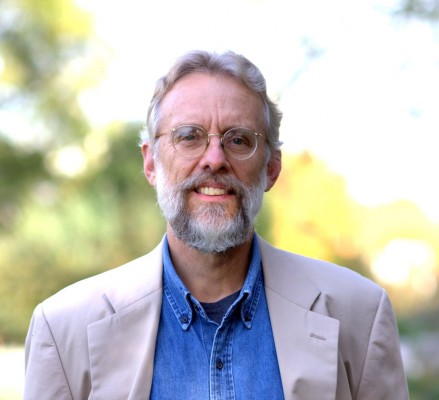
For more than 25 years, Barry Hart has exerted quiet leadership in the field of conflict transformation – it’s the kind that attracts little attention to the leader, but permits those around him to grow into their own leadership roles.
At EMU, Barry Hart is a professor of trauma, identity and conflict studies, holding a PhD in conflict analysis and resolution from George Mason University. He is also known as the person who launched EMU’s University Accord program, under which parties in conflict within the campus community can seek help from a trained mediator and work toward a positive outcome.
In the surrounding city and county, Hart is known as a founder of one of the first community mediation centers in Virginia. Since 2002 he has served on the board of the Community Mediation Center of Harrisonburg, Rockingham County and Greater Augusta County.
Further afield – in Europe – Hart is a founding member and current academic director of the 17-year-old Caux Scholars Program in Caux, Switzerland.
Under this program, two dozen university and graduate students from around the world gather for four weeks each summer in a beautiful mountain house owned by Initiatives of Change. There they delve into conflict transformation and analysis, trauma healing and justice, leadership and culture. Through his Caux Scholars leadership, Hart has nurtured 300 alumni from 85 countries, many of whom have gone on to play prominent roles in such fields as academics, politics, international organizations, and grassroots initiatives.
This year Hart is one of the planners for a summer 2009 conference on human security in Geneva, Switzerland. “We anticipate the conference will attract top-level government officials, diplomats, media experts, economists, and other leaders, as well as people working on the middle and grassroots levels,” says Hart. The conference is expected to cover how human security is impacted by the environment, the media, and the global economy, among other topics.
Finally, on a global scale, Hart is known for responding to requests for workshops on trauma healing and reconciliation. He has led sessions in the Balkans, where he lived for five years, as well as in Northern Ireland, Liberia, Sierra Leone, Guinea, Uganda, Kenya, Tanzania (among Rwandan refugees), Burundi, Somaliland, Egypt, Malaysia, and Indonesia.
These workshops have attracted diverse people – teachers, soldiers, police officers, religious leaders, politicians and civil society actors. Participants often “have experienced (or caused) the violence of war – the breaking of the human bond,” says Hart, yet many of them “become wise through their experiences and lend their wisdom to peacebuilding efforts in their communities and around the world.”
Hart is working on a joint project between EMU’s Practice and Training Institute and the University of Hargeisa in Somaliland to establish an Institute for Conflict Resolution and Peacebuilding in Somaliland.
Hart’s latest accomplishment is the editing of a 362-page book destined to be widely used in conflict transformation classrooms – Peacebuilding in Traumatized Societies, published in the spring of 2008 by University Press of America.
This book – containing 14 chapters by experts in peacebuilding – examines trauma, identity, security, education and development as central issues related to breaking the cycle of violence and building peace in fragile, conflict-torn societies. The relationships of transitional justice, leadership, religion, and the arts to peacebuilding are also covered.
